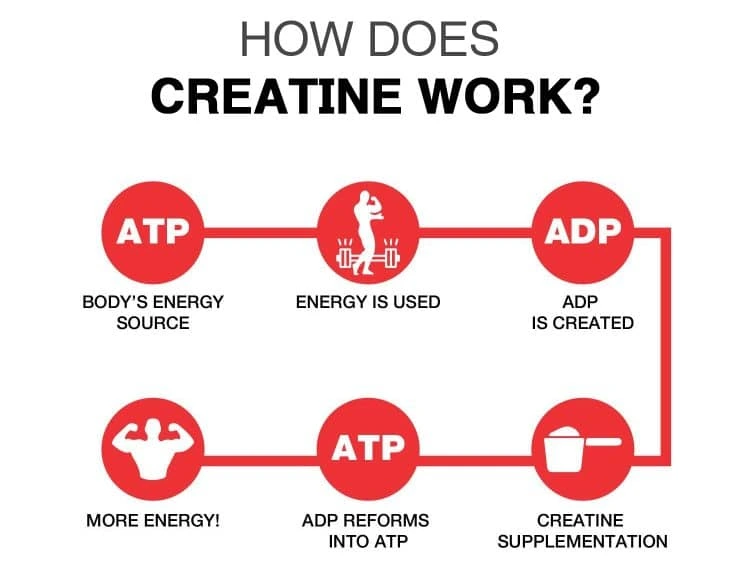
The Basics of Creatine and Effects on the Body
Creatine has been a staple supplement for fitness enthusiasts for decades. But what is it? And what does it actually do for you?
Creatine monohydrate is one of the most popular and best studied sports nutrition supplements ever. For more than 30 years, athletes and gym goers have relied on creatine. When used daily, it has been shown to support short-burst, high-intensity activity, as well as gains in muscle, strength, and power.
But how does creatine work?
How Creatine Works

Creatine works by aiding in the regeneration of Adenosine Triphosphate (ATP) by storing in the muscles and converting into phosphocreatine. ATP is what is known as the "energy currency of life" being the primary energy carrier in all living cells.
Each time your body uses this store of ATP, it releases another compound known as Adenosine Diphosphate (ADP). ADP is simply just ATP with one less phosphate group. Creatine then comes in to help restore that phosphate group, creating a new ATP phosphate, which is then used for more energy.
As a result, creatine can help you get more reps in strength training and sustain short-burst anaerobic activities - such as sprinting and jumping.
But creatine is a saturation ingredient, which means you need a certain amount before you can start to feel the effects of this. You can either "load" this into your system or follow a consistent regimen over a period of time.
For loading creatine, you would need 20-25 grams a day for 5 - 7 days. Then you would hit a maintenance period of 3 - 5 grams per day to maintain this level.
Does Creatine help me Gain Lean Muscle?
Studies have shown that creatine is proven to increase strength, muscle mass, and performance.
Proven to increase muscle mass through:
1. Boosted workload: It enables more total work or volume in a single training session, a key factor in long-term muscle growth.
2. Improved cell signaling: It can increase satellite cell signaling, which aids muscle repair and new muscle growth.
3. Raised anabolic hormones: Studies note a rise in hormones, such as IGF-1, after taking creatine.
4. Increased cell hydration: Creatine lifts water content within your muscle cells, which causes a cell volumization effect that may play a role in muscle growth.
5. Reduced protein breakdown: It may increase total muscle mass by reducing muscle breakdown.
6. Lower myostatin levels: Elevated levels of myostatin can slow or inhibit new muscle growth. Supplementing with creatine can reduce myostatin levels.
Is Creatine Right for Me?
Creatine is a supplement right for anyone looking to improve their workout performance and overall physique. As a naturally occurring supplement that our bodies already produce, it really has no side effects when taken properly.
Your body can produce about 1 gram of creatine per day, primarily through the liver, pancreas, and kidneys. But, if you're still concerned with taking any kind of oral supplements, you can always get your creatine through whole foods such as:
1. Fish - 0.4 - 1.1 grams per 4oz serving
2. Pork - 0.6 grams per 4oz serving
3. Beef - 0.7 - 1.07 grams per 4oz serving
4. Chicken - 0.3 - 0.5 grams per 4oz serving

Of course these are not vegan friendly, but our vegan friends can still find their way around supplement requirements through amino acids in certain fruits, nuts, and grains that aid in the production of creatine.
Recommended Daily Dose
Most places will tell you that 5 grams per day is the recommended daily dosage for creatine monohydrate. While some athletes may exceed this or take what's known as a "loading dose", the average person can expect to see results with just 5 grams per day as a general rule of thumb.
The Bottom Line
Creatine has been studied and tested for decades to determine its effectiveness on the human body during physical activity. While you can get the recommended daily dose of creatine through natural sources, creatine monohydrate powders are just as effective and generally non-harmful when taken as recommended.
And the beautiful part about creatine is it's a naturally occurring substance that our bodies already make.

